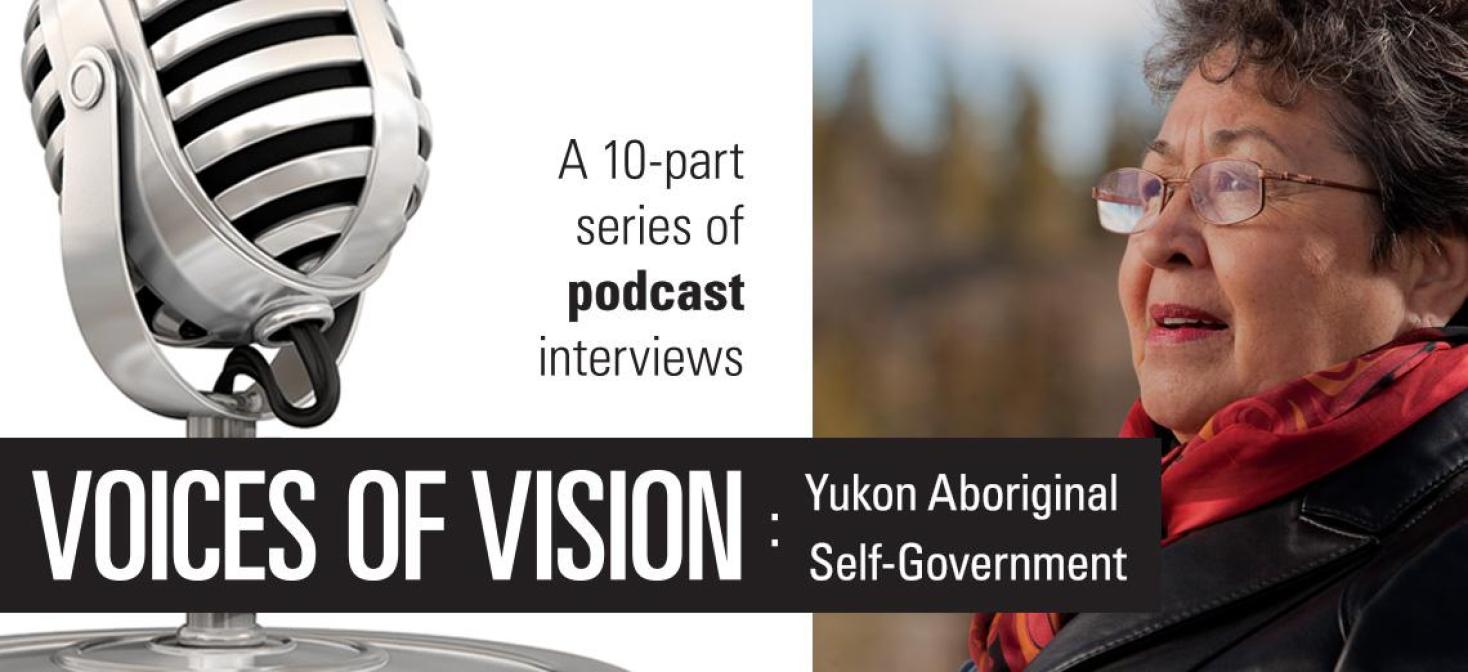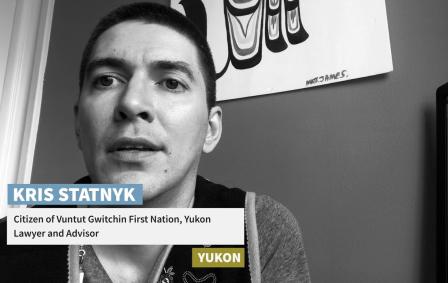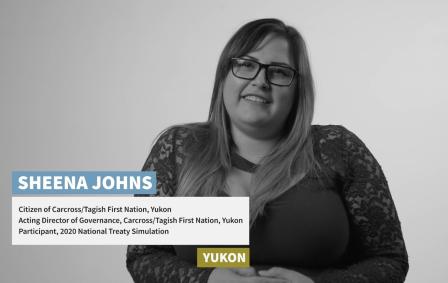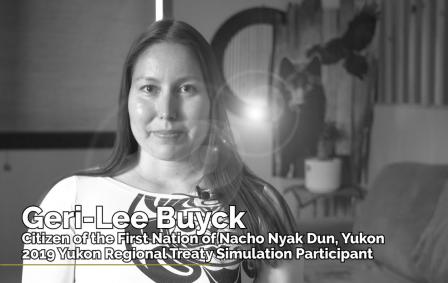Voices of Vision: An interview with Adeline Webber

Adeline Webber has worked tirelessly toward the recognition and acknowledgement of Aboriginal women's rights. Adeline, a Teslin Tlingit Council citizen whose Tlingit name is Kh'ayàdê, spent a considerable portion of her career working in the federal public service, including serving as the Yukon district director of the Public Service Commission of Canada. Now retired, Adeline remains an active volunteer in her community, including work with the Whitehorse Aboriginal Women's Circle, an organization she founded. Adeline provides a unique perspective into human resources and women's rights as they relate to self-government, land claims and implementation.
Transcription
00:00:00
ADELINE WEBBER: My name is Adeline Webber. I'm from Teslin Tlingit First Nation, Kukhhittan Clan. My name is Kh'ayàdê and I'm president of Whitehorse Aboriginal Women's Circle.
MEAGAN PERRY (VOICE OVER): Adeline Webber has been a leader in most sectors of Yukon life. She's now retired but that doesn't mean she's resting. She continues to work towards self-government implementation. She's one of the people ensuring that Yukon's aboriginal self-government and land claims agreements are put into practice.
ADELINE WEBBER: I think it was important to have the land claims agreements because prior to that people were just governed under the Indian Act if they qualified to be registered as an Indian. Otherwise we weren't recognized and the only people that had any assistance or any opportunities had to be registered Indians. And now with the land claims agreements we determined who our citizens were and are, and we are able to deliver programs for them.
MEAGAN PERRY (VOICE OVER): Those agreements are each signed by three parties – Government of Yukon, Government of Canada and the self-governing First Nations. And Adeline Webber has worked in all three governments. I'm Meagan Perry, and in February of 2011 I headed for the Whitehorse Aboriginal Women's Circle offices to meet with Adeline Webber. On the day before we met Webber attended a celebration where she saw one more part of the Teslin Tlingit Council Self-Government Agreement come to life.
MEAGAN PERRY: So hi there, Adeline.
ADELINE WEBBER: Morning.
MEAGAN PERRY: How are you doing?
ADELINE WEBBER: Not bad. I'm a little tired today, but fine.
MEAGAN PERRY: So there was a big event this weekend in terms of self-government in the Yukon. Why don't you – we'll start off, just you can tell me a little bit about that and your home town.
ADELINE WEBBER: Mm-hmm. Actually on Monday, yesterday, the Teslin Tlingit First Nations signed their Administration of Justice Agreement with the federal government and the territorial government. So it was wonderful to be there to be involved in the first justice agreement that's been signed with any First Nation in Canada. So, you know, it's just really, really exciting for the citizens and, in fact, the whole Yukon. It was just a powerful, powerful day to realize that the First Nation will now begin to administer the laws that, you know, they had in place many, many years ago, and now they'll be able to use them in combination with other courts in the system.
MEAGAN PERRY: So it's a real step forward for self-government then.
ADELINE WEBBER: It definitely is. This is one of the areas where, you know, there's been a breakthrough. It might have taken 14, almost 15 years for this to be completed but that's how long it takes for some of these things to get implemented. And then over the next four years it will be fully up and running.
MEAGAN PERRY: So that was a great moment in self-government implementation.
ADELINE WEBBER: Mm-hmm.
MEAGAN PERRY: And you've been working on implementation for years. What was it as a young person that sparked your interest in doing that work?
ADELINE WEBBER: What sparked my interest was the whole idea that when the land claims were first being negotiated and talked about over the years, First Nation people – with the exception of those that were registered Indians – didn't have any rights. They didn't have any rights to land, to education, to any of the benefits that people realize today. So – and to me that was unfair, and particular issues related to women, there was just discrimination against women so we were doubly jeopardized. So I would say that's what sparked my interest is the inequality amongst our people. You know, we were recognized as being darker skinned, of First Nation ancestry, but then we didn't have the rights to go along with it.
MEAGAN PERRY: How did you see self-government and land claims as taking you to a different place in terms of your position in society?
ADELINE WEBBER: I think the way I saw it was that through these land claims and self-government agreements that we would be able to determine who our citizens are, also run our governments in a way that is most appropriate for our citizens, and be involved in other things that are happening around the territory. You know our First Nations people are involved in many boards and committees and through that implementing the land claims agreements.
MEAGAN PERRY: Achieving self-government is a process that requires long-term commitment from all the parties. What have been the biggest issues that you've perceived during your time working towards land claims implementation?
00:04:57
ADELINE WEBBER: Well I think to begin with it was a whole new process for many of us at the community level. And so people had to learn how to go about implementing the claims, like understanding them. And then going forward to do the implementation there's also issues with money, you know, to deliver programs, to transfer – there are transfer agreements that First Nations had to take – work with the federal government, and I suppose the territorial government, with other issues. So it's a learning – I think learning, having qualified people at the community level to do the work that's necessary and to work towards what the First Nation want for their future generations.
MEAGAN PERRY: And the focus of much of your work has been human resources.
ADELINE WEBBER: That's right.
MEAGAN PERRY: What are the particular challenges that self-government presents from the perspective of a human resources expert?
ADELINE WEBBER: Well one of the things that I saw immediately after agreements were made was that there was a section on economic development and employment opportunities in federal and territorial governments where they were available. And I was working in the federal government at the time with the Public Service Commission of Canada and one of our areas we were working on was training and development. And so I got involved through the Training Policy Committee. I sat on the Training Policy Committee and Training Trust. I sat on those committees and made some decisions about what should be done in the area of training, setting aside those monies and distributing them so that First Nations people could be trained. The other thing that I saw as important was the need to develop a human resource plan for wherever there were job opportunities in the federal and territorial government. So as the director of the Public Service Commission I started working on that file and partnered with the Yukon Government human resource people and we developed the human resource plans for – both Yukon and federal government were developed through that discussion with First Nations. So we worked with the First Nations who had already settled and developed them together. And so that's been the model that's been used since then. And although there aren't very many federal jobs in the Yukon any longer, the plan is still the living document so it can be used, and the Yukon Government has their human resource plan, and they have been very active because they are one of the biggest employers in the Yukon and they have people working on that and I've seen a lot of people trained and doing jobs in the territorial government as well as the federal government as a result of implementing the land claims agreement.
MEAGAN PERRY: And is that training that wouldn't have been available prior to self-government, do you think?
00:08:13
ADELINE WEBBER: That's right, because we did have – one of the programs that I also was involved with at the Public Service Commission was the Northern Careers Program where we – it was a federal government program where we would literally take anyone who was interested, Status or Non-Status, and we would either educate them, find them jobs in the federal government – and it was very, very successful. We have very many people who are in senior government positions today who have taken advantage of those programs. So that was a very, very successful program. And then they shut that program down so, you know, other than that there was no opportunity.
MEAGAN PERRY: You were also very active in women's rights organizations over many, many years.
ADELINE WEBBER: Mm-hmm.
MEAGAN PERRY: How do you think that self-government has influenced the lives of aboriginal women in the Yukon?
ADELINE WEBBER: I think it's made a big difference because aboriginal women have been involved at the community level for years. Now that we have administration, self-government happening at the community level, aboriginal women have a majority of the employees – and most of them have been women. And we have more and more women Chiefs at the community level, women on council, and there's still small women's groups doing things that are important to them like language – they're reviving the language and culture and arts and things like that. So women have a voice at the community level, they're very busy – and not only with those things but raising their families as well.
MEAGAN PERRY: And now you were showing me pictures last time I was here of events that you'd held early on. Can you describe one of those early events? I was particularly taken with the photo of you near the graveyard.
00:10:11
ADELINE WEBBER: Oh, years ago – back in about 1975 or '76, something like that – the Yukon Aboriginal Women's Council saw the need to ensure that our burial grounds were treated with respect.
MEAGAN PERRY: Where were those burial grounds? For people who don't live in the Yukon.
ADELINE WEBBER: There are burial grounds throughout the Yukon but the ones that are most prominent but that people were wandering through even when there was a funeral happening was the one downtown in Whitehorse. Just as you come down the Two Mile Hill there's a graveyard on the hillside there. And then at Champagne there's a very large burial ground there. So what we did was we organized one of the first demonstrations that was ever held in the Yukon. We put up signs at the burial sites – that are still there today – that say that, you know, these are sacred burial grounds and then under certain ordinance of the Yukon Act they're not to be used otherwise. So we stopped tourists just coming through and just wandering and desecrating the graves in some cases.
MEAGAN PERRY: That's amazing. How many people were there?
ADELINE WEBBER: I would say there was at least 30 or 40 and it was a little nerve-wracking because even in those days, you know – and nowadays if you have a demonstration or a walk or anything you have to get permits and everything else. We didn't. We didn't have those back in those days. We probably should have but we got away with it and we made our mark.
MEAGAN PERRY: Yes. Now self-government, was there a time in the course of your work that you felt self-government had made a breakthrough and you could see that it was having a positive effect on Yukoners?
ADELINE WEBBER: I think from time to time, you know, you could say that there was a breakthrough. But for me because things are just so fresh for me from the Teslin Tlingit taking down their Administration of Justice agreements that – to me that's a real breakthrough because it's just so fresh.
MEAGAN PERRY: Was it a good party?
00:12:21
ADELINE WEBBER: Oh, it was wonderful. They had dancing and like a whole celebration. It was just the morning and we had, you know, a gathering after the signing of all those agreements and a few speeches and gift exchanges. And there's going to be a big celebration at the end of March at the next General Assembly. Unfortunately I won't be there but that's OK.
MEAGAN PERRY: Sometimes it's difficult for younger people to see, to recognize the changes that self-government has brought into their lives. And can you think of a concrete example in the day-to-day benefits of self-government?
ADELINE WEBBER: Well, because of self-government, you know, the people today have many more opportunities because, as I said earlier, it was only those that were registered Indians, who had the benefit of being a registered Indian with Indian and Northern Affairs, that had any benefits as a First Nation person. When we – today there are many programs and services available to everyone. And the other thing is that a lot of culturally appropriate programming is happening at our community level and at the friendship canter and other places. And, you know, many, many more people are able to get an education. There are jobs in the federal, territorial and community for people that are willing to take that jump into a career and there's much more support for them. And I think just having a voice at the community to speak up for you or to assist you is more than we had when we were young, for sure.
MEAGAN PERRY: And now the Yukon First Nation and land claims and Self-Government and the Umbrella Final Agreement are big, complicated documents. How do explain them in simple terms for lay people?
ADELINE WEBBER: I think the first thing you have to do is not just give them the great big book. [laughs] And what we've done – I mean what has been done, I should say – there are documents that simplify the whole agreements and there's a document that's entitled Understanding the Agreements. And then each of the First Nations – not each of them but several of them – have developed documents to help their citizens understand the agreements. And we as aboriginal women have taken it a step further and we have developed a workshop for aboriginal women where we go through and help them understand what is contained in each of the sections and spend some time discussing it and what it's all about, because if you look at any of the work descriptions or the job descriptions that you see in the newspaper looking for people working at the community level, one of the first things you'll see is “must have a good understanding of the land claims agreements” and things like that. And not everybody has that opportunity to learn. So it's important that we do everything we can to do it in digestible chunks. So I guess holding small workshops or small discussion groups – like in an evening you could sit around over tea and coffee or whatever and just talk about what different sections that might be of interest. Like now, for instance, understanding the justice agreement at the community level, I know that Teslin is planning to have little discussion groups to help citizens understand what their benefits are and how they can take advantage of these agreements. So as I said, don't give them the whole agreement. Talk about it.
MEAGAN PERRY: And when you've been at those sessions, what kind of reaction do you get from people as they come to understand the self-government agreements?
00:16:13
ADELINE WEBBER: Well I think the thing is is it's not as complicated as they may think. It's like anything. If you take it in digestible chunks, it's easy to understand and it's not so daunting. Don't try to digest it all in one chunk because you never will.
MEAGAN PERRY: Go slowly.
ADELINE WEBBER: That's right. That's right. Take your time and learn it, and it will be more helpful.
MEAGAN PERRY: The self-government agreements are unique in Canada. Implementing them takes time.
ADELINE WEBBER: Mm-hmm.
MEAGAN PERRY: How do you think that the governments are going to overcome the challenges that go along with developing something new like self-government?
ADELINE WEBBER: Well I think you have to be creative. You have to be open-minded. You have to be willing to work towards the goal. And I think it's important to have clear vision in order to meet your goal.
MEAGAN PERRY: Yukon First Nations have a long history of commitment to land claims and self-government issues. What is it like to be part of that history?
ADELINE WEBBER: Well I think it's important that we are part of it and, you know, whatever small contribution I might have made is important to the future for my children and grandchildren and those yet to come. So it's important that this work had to be done, and I'm proud to be part of it.
MEAGAN PERRY: Thanks for talking to me today.
ADELINE WEBBER: Thank you very much and I wish you all the best.
MEAGAN PERRY (VOICE OVER): That was Adeline Webber. She spoke to me in February of 2011 about Yukon land claims and self-government. The opinions expressed in this interview are intended to deepen public understanding of the history of land claims and self-government implementation in the Yukon, and represent the thoughts and ideas of the interviewee alone. This series of podcasts was produced by the Implementation Working Group, a cooperation between Council of Yukon First Nations, Government of Yukon, Government of Canada, and Yukon's self-governing First Nations.


